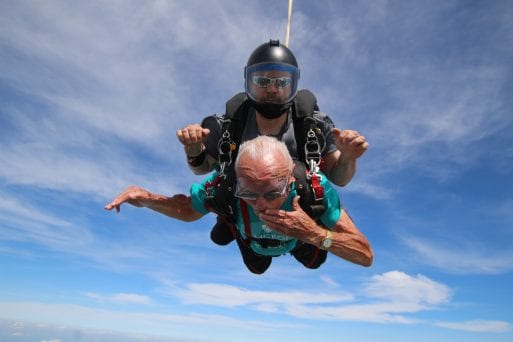
John, 89, had always wanted to go skydiving when Second Wind Dreams made it happen.
Credit: Courtesy of Elmcroft Senior Living in Indiana
An Important Note to Our Readers
SevenPonds is delighted to share the resources in the following article with you. However, please be aware that we are not affiliated with any of the organizations mentioned in this article, nor can we make arrangements or inquiries on your behalf. If you would like help arranging to have a wish granted for a loved one, please click on the name of the organization you’re interested in (shown in blue) and you will be taken directly to its website.
Thank you!
When Belmi Tepeque was diagnosed with stage-four gastric cancer, she was aware of foundations that grant wishes to children — but not adults. At just 22 years old, the Santa Barbara resident had already faced several challenges in life. She hadn’t planned to become pregnant during her senior year of high school, which had forced her to set aside plans for a higher education. She’d wrestled with postpartum depression that caused her to feel distant from her 4-year-old daughter, Genesis, as a baby. And as cancer robbed her of her health while draining the family’s time and finances, she struggled with the fact that she couldn’t always be fully present for her husband, daughter, and 8-month-old son Isaiah. Tepeque wondered how to make that up to them — especially spunky, fun-loving Genesis, who enjoyed nothing more than being in the water. Then, her social worker encouraged her to apply for a trip to Hawaii with the Dream Foundation.
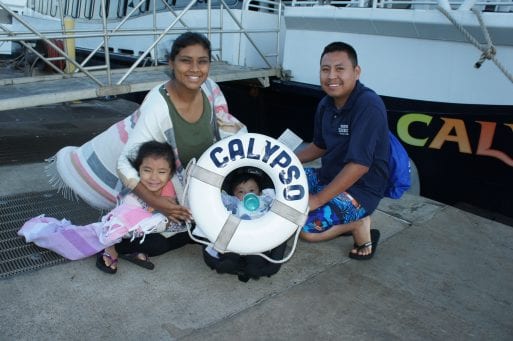
Belmi Tepeque with her family in Hawaii.
Credit: Courtesy of the Dream Foundation
The Dream Foundation is one of several U.S. organizations that grant wishes or provide retreats to adults who are terminally ill, elderly, bereaved, or navigating a serious disease. Some serve adults with terminal illnesses nationwide. Others focus on a subset of the population — such as seniors, or mothers with young children. Still others provide retreats and outdoor experiences to individuals managing cancer or families who’ve lost a loved one.
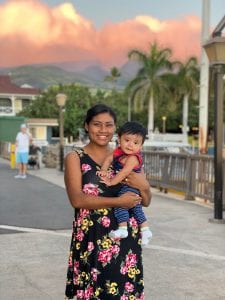
Credit: Courtesy of the Dream Foundation
And there’s a dire need for their services. In the United States, six in 10 people live with a chronic condition such as heart disease, stroke, cancer or diabetes, according to the Centers for Disease Control and Prevention. Heart disease and strokes kill more than 859,000 Americans every year, while more than 1.6 million people are diagnosed with cancer and nearly 600,000 die from the disease.
For individuals such as Tepeque, whom the Dream Foundation sent to Maui to stay in a luxury condominium with her family, having her adult wish granted made all the difference. “I’m not just the one fighting right now, it’s my whole family that’s fighting,” Tepeque said. She valued the chance to connect with her husband in a meaningful way — rather than figuring how to make rent or put gas in the car — and to take her daughter swimming. “That was just a dream come true, stepping into the clear water. And to see my daughter happy and not wanting to leave the beach? It was just an unbelievable experience.”
Programs Let Adults Make a Wish, Too
As the nation’s oldest adult wish-granting organization, the Dream Foundation was founded 26 years ago by a man named Thomas Rollerson, who’d tried and failed to find an adult wish-granting foundation for his dying partner. Since its Santa Barbara inception, it has gone national, granting more than 32,000 end-of-life dreams. These range from facilitating family get-togethers or travel to Hawaii or theme parks, to practical items such as hearing aids or a lift chair. Recently, the Dream Foundation has seen a significant increase in requests for tablets or laptops to keep families connected. Other popular requests include meeting celebrities or public figures, while some ask that their artistic work be published, exhibited or heard by industry professionals. “The gratitude that we receive from the families of our recipients — sometimes it can be years or decades later we’re hearing from people about having that particular dream fulfilled or approved,” said CEO Kisa Heyer. “It changes the entire narrative at the end of life.”
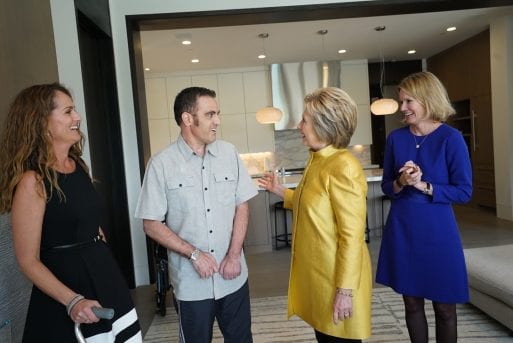
Dream Foundation CEO Kisa Heyer (right) with Hillary Clinton and a wish recipient with ALS.
Credit: Courtesy of the Dream Foundation
While Heyer finds all dreams inspiring and rewarding, there are some that stand out. There was the 90-year-old woman with an oxygen tank who wanted to go skydiving and was cleared to do so by her physician. There was the man with ALS who wanted to meet Hillary Clinton when she was a presidential candidate in order to advocate for research and awareness related to the disease. And there was the 40-year-old man with a rare brain cancer, who wanted to make a dance video with his four-year-old daughter that could be viewed at her wedding in lieu of the traditional father-daughter number. “That one really gets me, to think about the impact of that 20 years down the road,” Heyer said. “Every recipient that I’m able to see and be involved with, it’s just really touching.”
The recipients of such kindness are also deeply moved, and often end up fundraising for the organization that helped them — or even founding their own. When Don Czerniewski’s wife, Stella, was dying of colon cancer in St. Peters, Missouri, she dreamed of going to Disney World. And after a 16-year-old girl from their church raised the money for them to do so, the couple talked about creating a foundation to serve adults 18 and older with stage-four cancer. In 2008, about a year after she died, Stella’s Wish Foundation was born. It has since granted more than 190 adult wishes nationwide.
“The hardest part is picking the wishes,” said Czerniewski, whose foundation receives 30 to 50 requests a month but can only grant two or three. Some people ask to meet a celebrity — such as the St. Louis woman who wanted to connect with pro-wrestler Kevin Nash. They’d planned a party for him at her house and invited 50 people, but when the day arrived, she was in the hospital. “We took him to the hospital, and he talked to her and her family for five hours,” Czerniewski said. “And then he talked to her for the next five, six months until she died.” Other common wishes include travel to connect with family and trips to Disney World.
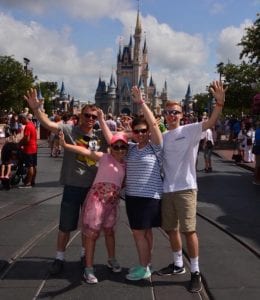
Thanks to Jessica Mizell, her 40-year-old cousin, Lisa Marie Schnaath, was a Disney World wish recipient. After seeing a post on Facebook about Schnaath’s desire to visit the theme park with her husband and two children, Mizell contacted Stella’s Wish Foundation before reaching out to family members to raise extra funds. Stella’s Wish Foundation granted Schnaath’s wish at a fundraising banquet, which she attended under the guise that it was her grandfather’s 80th birthday celebration. “She was shocked,” said Mizell, who was close to her cousin — they were born just 11 days apart. “She just cried and cried.” Schnaath visited Disney World in June 2018. A month later, the cancer spread to her brain, and in September of that year, she died. “They had a beautiful week at Disney,” Mizell said. “They stayed on the property, got to go to all the parks, got to swim with the dolphins at Discovery Cove.” In her remaining time, Schnaath became an advocate and fundraiser for the organization, and Mizell now serves on its board.
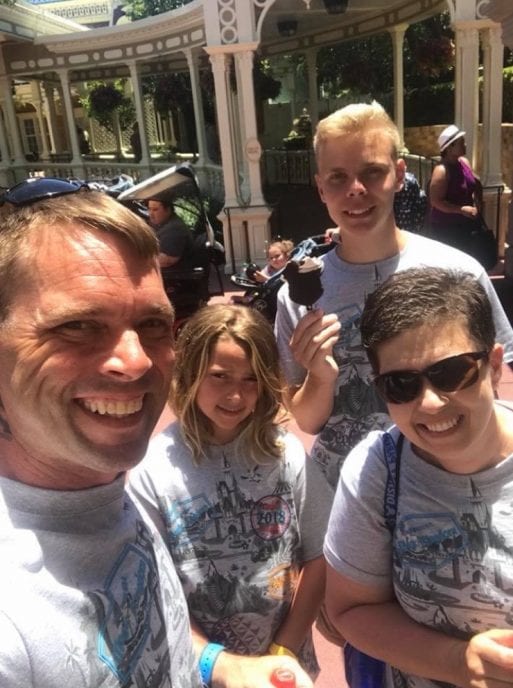
Lisa Marie Schnaath enjoyed a final vacation with her family at Disney World.
Many adult wish recipients seek an opportunity to travel and reconnect with their family — especially mothers with young children. Missy Phipps, co-founder and president of Ally’s Wish, a Texas-based nonprofit that grants wishes to terminally ill mothers with children under 18, said she was inspired to found the organization after Allyson Hendrickson, a woman at her church and a mother of three, was struck with ovarian cancer. As a recently divorced mother of four, Phipps asked herself what she’d want in that position. “The only thing I’d want to do is make as many memories as possible,” she said. “To spend that quality time away, and maybe just for a minute not to think about what we’re having to deal with.” Six years later, the foundation has granted close to 150 adult wishes. Disney World and Hawaii are common requests, while other families ask for puppies or time together in a lake house. Still others want backyard renovations or an early Christmas celebration.
Academics say it’s not surprising that people choose to focus on family at the end of life. “The family is the core of the social network for most people,” said Hui Liu, a professor of sociology and the director of the Family and Population Health Laboratory at Michigan State University. “And most research will agree that the marital relationship is the most important relationship in terms of its impact.”
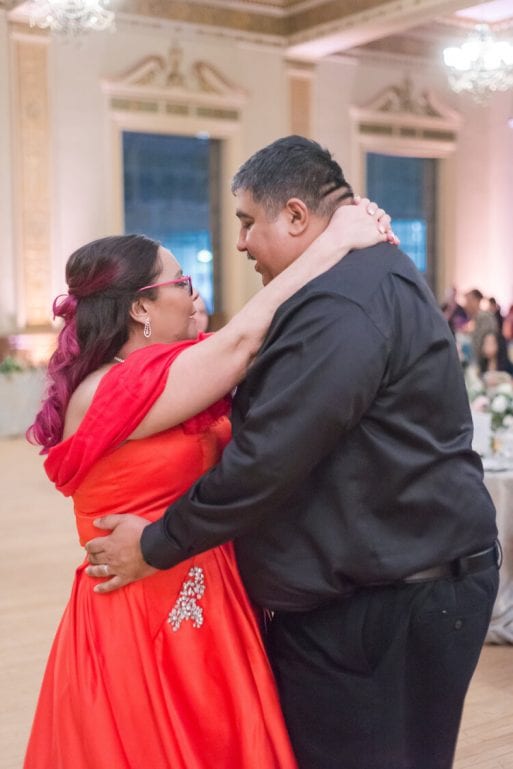
Rosemarie and Happy renewed their vows in the company of their three daughters a month before she died from metastatic breast cancer.
Credit: Wish Upon a Wedding
For couples looking to cement that crucial relationship, Ohio-based Wish Upon a Wedding grants weddings and vow renewals to couples facing a terminal illness. Liz Guthrie, a wedding planner in northern California, was inspired to found the organization after witnessing the impact of donating her services to a bride suffering from a serious illness. And since 2010, the organization has staged more than 140 ceremonies nationwide — thanks to wedding planners and other vendors who offer their time, talents and resources for free. To make this viable, weddings take place on weekdays and are intimate, alcohol-free gatherings of 50 people or less. “Hope is just good for people,” said Programs Coordinator Lacey Wicksall Eldersveld. “Just the process of looking forward to something, of planning it, of wishing for it, and then watching it come to fruition, is a distraction from all of the treatments, and all of the things that they’re going through. And it just brings them so much joy.”
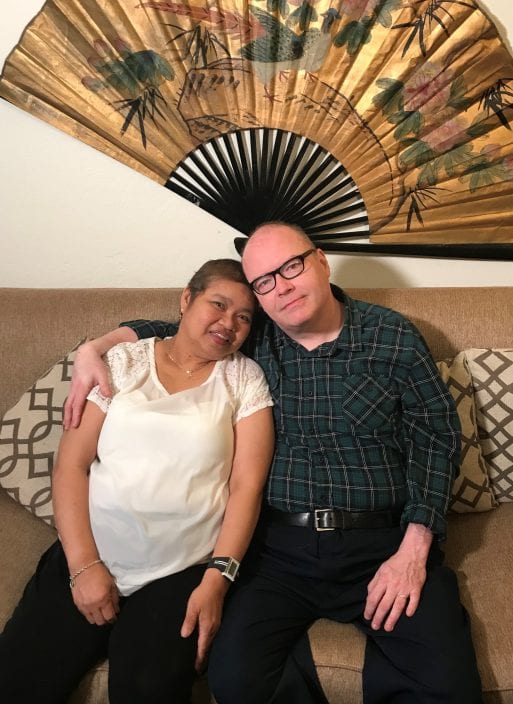
Jesse and Gloria Dejesus on their couch at home.
Credit: James Bess Foundation
For others, adult wish foundations enable recipients to meet up with family members at a distance. When Jesse Dejesus’ wife, Gloria, was diagnosed with stage-four uterine cancer in September of 2018, she was living in Nashville and hadn’t seen her mother and siblings in the Philippines in three years. She’d had plane tickets to visit for five weeks over Christmas but had to cancel them for a paltry refund — undergoing a hysterectomy and chemotherapy instead. In February of last year, she was declared cancer-free, but when she went in for a follow-up CT scan three months later, it had returned. Her doctor recommended applying to the James Bess Foundation.
Mindy Bess was inspired to establish the foundation after her father, James, was diagnosed with glioblastoma, an aggressive brain cancer, at age 38. The family was living in Florida at the time, and Bess had tried desperately to connect him with his favorite musician, Garth Brooks — or even send him to a concert. It proved impossible. “Adults deserve to have their wishes come through, too,” Bess said. “A lot of them are married, and they have families. And then something tragic hits them, like a terminal illness, and where do they get the hope and the joy from to keep fighting? Well, they don’t.” Bess decided that one day she would found a wish-granting organization for adults. Fifteen years later, in 2015, she established the Nashville-based foundation, which has granted more than a dozen wishes to adults with a life expectancy of 18 months or less around the country. Because she’s still working on finding regular donors, Bess solicits donations from companies, raises funds through social media, and makes it happen however she can.
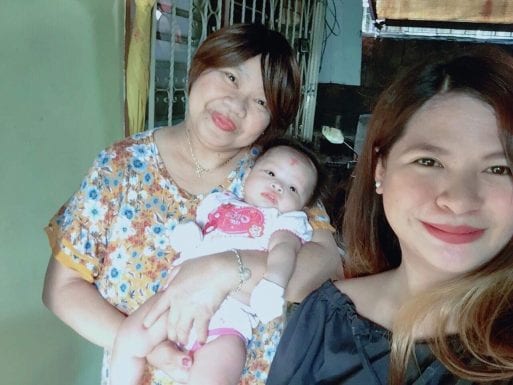
Gloria Dejesus with family members in the Philippines last summer.
Gloria Dejesus, for one, was grateful. Last July, she had the opportunity to spend 23 days with her family in the Philippines. “She got to see her mama, who survived the Japanese occupation,” Jesse Dejesus said. “She got to see her two brothers, one sister and a whole bunch of nephews.” Several months later, Gloria Dejesus fell ill, and in mid-January, she entered home hospice. “She died in my arms,” Jesse Dejesus said. “Face to face, eyes to eyes. I’m still pretty traumatized about that.” He misses many things about his wife of 25 years, including her goofy humor, the way she called him “honey” and how much she appreciated it when he’d shaved. Still, Jesse Dejesus takes comfort in the fact that she’d been able to see her family one last time. “I think it gave her a sense of happiness and peace,” he said.
Bess, who was inspired by the palpable love between Jesse and Gloria Dejesus, has been equally invigorated by the response of other adult wish recipients. She fondly recalls Randy Clayton, a 50-year-old with lung cancer from Holland, Michigan, who’d never traveled outside the region and wanted to see the ocean. “When I talked to him about everything he was very despondent – this depressed, defeated mentality,” she said. The James Bess Foundation sent Clayton to Panama City Beach, Florida, with his brother, where the duo went on a dolphin watching tour and spent time at the beach. After his return, Bess called him to see how the trip had gone. “It was like a complete 180,” she said. He enthused about seeing palm trees for the first time and spotting a lizard on a bench. “Just these simple things meant so much to him,” she said. “It not only transforms the life of the actual client, in this case Randy, but it transforms the lives of their family, their friends, and their whole entire community.”
Retreating From Illness
Transforming families and communities is what Deliver the Dream, a Florida-based organization that provides retreats for families statewide navigating illness or death, is all about. Founded by a businesswoman who’d experienced the challenges of keeping a family together during illness, Deliver the Dream provides specifically tailored three-day retreats to families with adults suffering from cancer or bereavement, as well as those whose children struggle with conditions ranging from autism spectrum disorder to spina bifida and cerebral palsy. “Often, they get so caught up in the things that need to be done specific to the disease and fighting the disease that they lose touch with one another and they’re disconnected,” said Executive Director Paul Withrow. “So the idea is that if we can bring up to 15 families who have the same diagnosis together, what better support system can there be?”
Deliver the Dream began operating in 2002 and typically provides 11 retreats a year. Withrow describes the experience as a “summer camp compressed into three days” that starts with icebreakers, moves into activities such as rock-wall climbing, campfires and bounce houses, and then progresses into support groups for different ages. “You’re kind of breaking down walls,” said Withrow, adding that families have gone above and beyond. Once, when a family needed a wheelchair ramp for their van, another that had recently donated theirs went to ask for it back. Then the group gathered the necessary materials from Walmart, and the family woke in the morning to find their wheelchair ramp installed. “That’s the kind of sharing and real sense of caring that comes out of these things,” Withrow said.
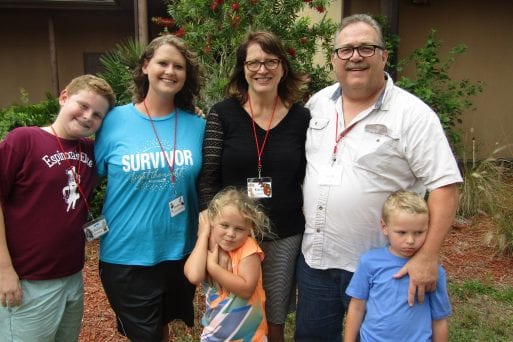
Jessica Strohauer with family members at Deliver the Dream’s bereavement camp.
Credit: Becky Raymond, Deliver the Dream
Jessica Strohauer, a two-time lymphoma survivor, attended a March 2019 retreat for families who’d experienced the death of a loved one. Her boyfriend and the father of her now six-year-old twins had succumbed to addiction four years prior, and she attended with her twins, her older son, and her former boyfriend’s parents. “It just felt like we were surrounded by people that we’d known for years, that everyone genuinely cared about us,” she said. “But our breakout sessions were definitely the thing that I needed the most. Because after their father died, I never really talked to his parents. We didn’t have that conversation about how we actually all felt.” Strohauer said that seeing her boyfriend’s mother, who was usually so stoic, cry over her son’s death, was deeply healing. “It really brought us closer together,” said Strohauer, adding that spending time with families who’d gone through something similar was “almost magical.”
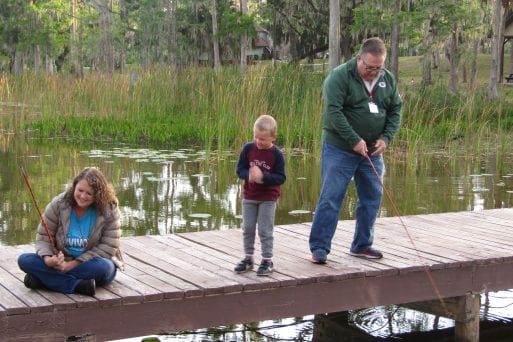
Jessica Strohauer fishing with her son and her former boyfriend’s father.
Credit: Becky Raymond, Deliver the Dream
Other organizations create individually focused outdoor experiences that aim to foster that same sense of solidarity and group cohesion. Michigan-based Reeling and Healing Midwest offers fly-fishing wellness retreats to women managing or moving on from cancer. And Epic Experience organizes week-long outdoor adventures in the Colorado Rockies for cancer patients and survivors. Epic Experience Founder and CEO Nancy Ferro said that participants are encouraged to come on their own, as each camp’s 11 participants bond over cross-country skiing, snowshoeing, whitewater kayaking or other group activities. “Anybody going through cancer or a major illness — it’s the anxiety, the depression, and just the isolation,” said Ferro, who was inspired to found Epic Experience after she watched her oldest son suffer from depression due to testicular cancer. “That’s probably the number one thing — to know that they’re not alone.”
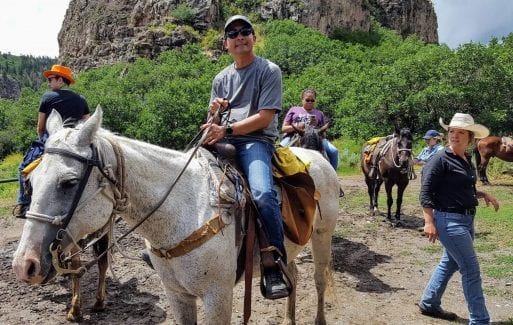
Louis Chinn at a camp for adults who’ve had cancer in the Colorado Rockies.
Credit: Courtesy of Epic Experience
Louis Chinn, who has stage four thymic carcinoma, attended a camp in the summer of 2017 — and he enjoyed it so much that he now chairs the organization’s board. While he appreciated the activities, including whitewater rafting, kayaking and horseback riding, Chinn found the small-group discussions and campfire sessions, when people would share their innermost thoughts and feelings, most powerful. “It helps the soul,” he said. “I think each of us have people that are supporting us, there are caregivers, but unless they’ve gone through it there’s not 100 percent connection and really truly understanding the sense of potential isolation, the dark cloud that’s always hanging over us.” Afterward, many campers stay in touch over a Facebook alumni page or even see each other in person.
One particularly close group, which included many women under the age of 45, resulted in three former campers traversing California to be with another when she was dying, Ferro said. During that group’s camp experience, she fondly recalled entering the lodge after the campfire to find several of them laughing hysterically. They told her they were writing their obituaries. “But they were laughing and cracking up — you’re going to say this, you’re going to come to my funeral and you’ve gotta tell that joke,” Ferro said. “It was magical — just the fact that we were offering up the freedom and a safe place where they could be laughing about something that most people would not be.” In addition to the support and connection, Ferro said that many participants find being outdoors deeply healing. “I think it’s the constant in everything,” she said. “A lot of healing comes just from being out in nature.”

Louis Chinn in a personal kayak at an outdoor camp in the Colorado Rockies.
Credit: Courtesy of Epic Experience
A great deal of research has linked nature to mental health benefits, including a 2015 study that found significant shifts in brain activity after participants walked for 90 minutes in a natural environment, as opposed to those who walked along a busy thoroughfare. “We have found nature versus urban walks to result in decreased rumination, stress, anxiety, and improved positive mood and working memory,” said lead author Gregory Bratman, Assistant Professor of Environmental and Forest Sciences at the University of Washington. And co-author Gretchen Daily, Bing Professor of Environmental Science at Stanford University, said that while all individuals respond differently, this could prove particularly helpful to those facing serious illness. “It is possible that a reduced tendency to ruminate and focus on the self could help lift people up from sadness or regret, to connect with dimensions of our world much greater than themselves,” she said.
For those who can’t take a retreat or vacation, more traditional organizations do what they can to bring joy — and even nature — to the bedside. “We try to do whatever they’re physically able to do,” said Peggy Carroll, founder of the Fill Your Bucket List Foundation, though the organization’s wishes for adult cancer patients in North Carolina are indefinitely on hold due to the COVID-19 crisis. There was a man who wanted to hear a quartet sing, so she recruited a men’s group from her church. Despite the fact that he wasn’t feeling well that day, the patient kept asking for more — and they sang everything in their repertoire, more than once. “Everybody was singing along and clapping, and it was just beautiful,” Carroll said. “He passed away a couple of days later and they asked the quartet to sing at his service.”
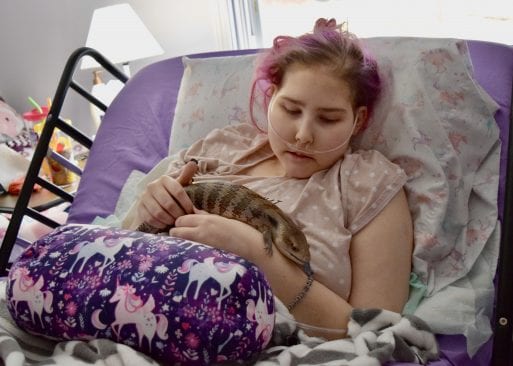
Jamilyn, who is battling metastatic mesothelioma, with a lizard.
Credit: Fill Your Bucket List Foundation
Another adult wish recipient, a young animal-lover named Jamilyn, was able to visit with an exotic assortment of animals—including lizards, a bird, and even an anteater—at her bedside. “The wishes are really a lot more simple than I think we’d anticipate,” Carroll said.
Programs for Seniors Enhance Final Days
Such simplicity grows more poignant with age. In the 1980s, PK Beville was a psychologist doing evaluations in long-term care facilities when she was struck by the minimal nature of many residents’ desires. One question in her evaluation asked participants to use the prompt “I wish” to make a statement. “The responses I was getting were things that you and I would never think of, but were serious for them,” Beville said. “I wish I had a new blanket. I wish I could go visit the graveside of my wife. I wish I could have a steak dinner. I wish I could see my son again.” In 1997, Beville founded Georgia-based Second Wind Dreams, which has since fulfilled more than 10,000 dreams for seniors in a congregate living setting or receiving home health care.
Over the years, Beville, now the organization’s CEO Emeritus, has continued to find the smallest wishes most rewarding. One man in a Georgia nursing home simply wanted a cup holder for his wheelchair and couldn’t get one because he didn’t have the money and it hadn’t been ordered by his doctor. Beville obtained one by donation from the local medical aid store. Suddenly the recipient, who’d been unable to leave his room without hydration due to his disease, was able to participate in group activities. “He’d been sort of an old curmudgeon in his room, and he was isolated, and nobody got to know him,” Beville said. “And that man changed so much he became the president of the residents’ council.”
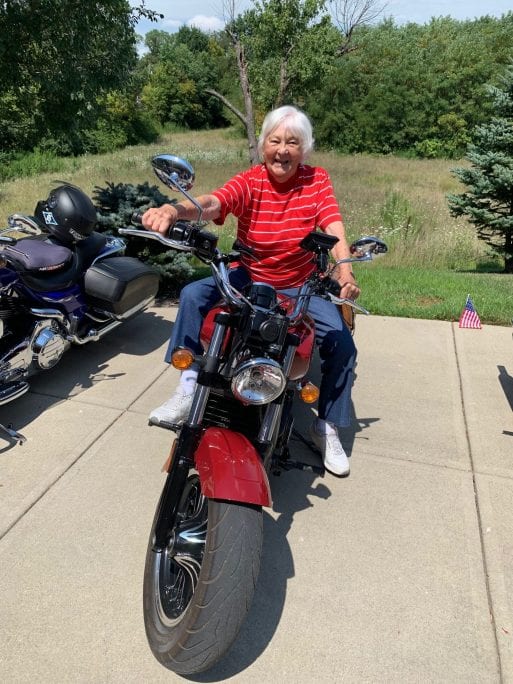
A Second Wind Dreams recipient rides a motorcycle.
Credit: Courtesy of Second Wind Dreams
The most popular category for wishes is adventure — things like riding a camel, visiting a zoo or aquarium, riding a dune buggy or motorcycle, or skydiving, Beville said. Another common request is to go home again. And while care home residents can sometimes spend a night there accompanied by a nurse, other times home is just a place they’re hoping to reclaim. “They want their kids back, they want their car back, they want all of those things that we can’t do,” Beville said. “So we narrow that down — what was your favorite thing about home? And then they’ll tell us, and we’ll try to recreate that.”
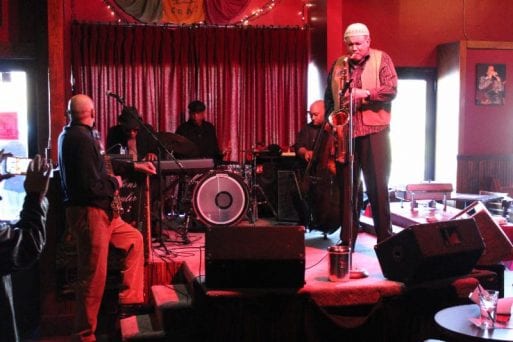
A “Sleeping Dreamer” named Darwin plays the drums at an Atlanta music concert.
Credit: Courtesy of Second Wind Dreams
Recreating life experiences, such as a job or favorite hobby, can also be a powerful tool that brings some memory back for adult wish recipients with dementia, Beville said. “We call them Sleeping Dreamers, because they wake up during the dream, and family gets to see them again in a way they haven’t seen them in many years.” One of her favorite “Sleeping Dreamer” memories was when she brought two former musicians to play at an Atlanta music concert before a punk rock crowd. Beville expected attendees to respond with apathy. “When they started playing, that audience of kids, with their weird hair and their tattoos everywhere — they rushed the stage,” she said. “It was the sweetest, most amazing thing.” Not only did the participants remember how to play, but they also spoke on the microphone and did interviews. Such outcomes are what inspired Beville to start the foundation in the first place. “It was important to me, after loving working with these elders all these years, for the people in the outside community to begin to see them as I did,” said Beville, who is also the creator of a worldwide “Virtual Dementia Tour” that lets caregivers experience what it’s like to live with the condition.
Cass Forkin, Founder and Chief Visionary Officer at Twilight Wish Foundation, was similarly inspired to serve the elderly. Some 1.3 million Americans live sequestered in nursing homes, according to the CDC. And the total number of Americans in long-term care is expected to reach 27 million in 2050, according to the Department of Health and Human Services. Forkin was working as a health consultant in one such facility when something struck her as off. “There’s no joy,” she said. “It felt like it was tied to treating our seniors as if they were items on a shelf rather than people with lives.” After thinking and praying about it, Forkin decided to create a wish foundation for seniors, and some 17 years ago, Twilight Wish Foundation was born.
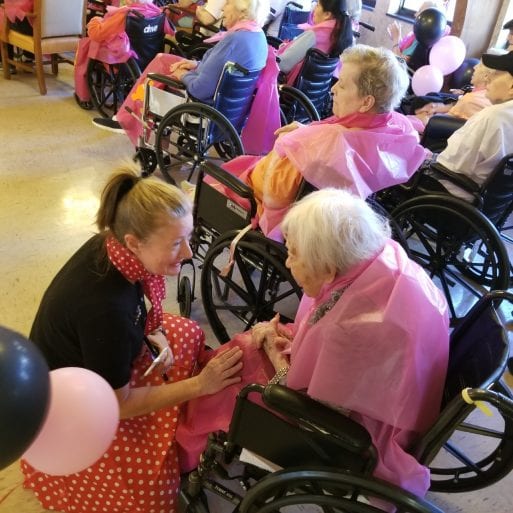
Cass Forkin with Claire, 101, at Luther Woods Nursing & Rehabilitation Center.
Credit: Twilight Wish Foundation
The foundation now grants about 8 to 10 adult wishes a month to seniors 65 and older whose income is 200 percent of the poverty level or less — even though they’d like to do more. “It hurts my heart to say it, but I think they didn’t think they were worthy unless they were dying,” said Forkin, adding that about 10 percent of requests come from hospice patients. For Forkin, there are several hospice wishes that stand out. There was the man who wanted to learn to read before he died — and did so in his last few months of life. And there was the woman who’d written songs that had never been heard by people in the music industry. On her hospice bed, the Americana Music Association, radio broadcasters and industry professionals listened and gave her feedback, and her song played on the radio the very week she passed away. “She didn’t die with her song inside her,” Forkin said. “She got it out there.”
For patients who aren’t in hospice, Forkin finds that wishes are “all over the place.” There was a woman in California named Muffin who’d always had trouble hitting a baseball because of a spatial disorder and really wanted to hear the crack of the bat when she had contact. So at a special event, they gave her 100 chances, and on the 36th throw, she did it. “She started jumping up and down and doing a wave,” said Forkin, adding that Muffin had hit the ball another three times. “You just don’t know what it is about people’s wishes.” Other adult wishes have included publishing books and riding in open-cockpit biplanes, hot air balloons, and blimps.
One theme that’s unique to seniors, Forkin said, is reliving a job experience — something Beville often does with dementia patients. Through the Twilight Wish Foundation, a former postman in a wheelchair returned to Jenkintown, Pennsylvania to do his route one more time. And when a former waitress went back to the place where she’d worked for 50 years, the entire town turned out to share stories of how she’d touched them. One woman said she’d had a miscarriage and couldn’t eat, and the only thing she was able to get down were the vanilla shakes this waitress would serve her. Another man said his parents couldn’t afford sundaes, and she would provide them for free. “She loved people so much,” Forkin said. “And then when she wanted to come back, she got to have a life celebration while she was still alive.”
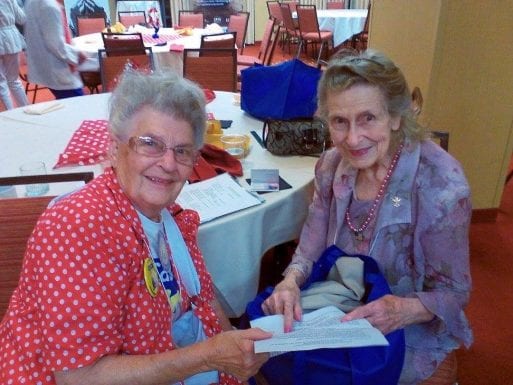
Mae Krier with a friend at the 2015 American Rosie the Riveter Association convention in California.
Credit: Twilight Wish Foundation
Simple recognition can prove life-changing for many seniors. When Mae Krier, a former Rosie the Riveter who’d spent decades working to get women’s WWII efforts in factories and shipyards recognized, stated in a newspaper article that she wanted to attend the American Rosie the Riveter Association’s 2015 National Convention, the Twilight Wish Foundation made it happen. “There’s not many of us Rosie the Riveters left anymore, so it’s always fun to get together,” said Krier, who didn’t have the funds to get to California on her own. Krier, who helped build B-17s and B-29s at Boeing and is now 94 years old, has since become a national figure. She makes regular trips to Washington, met former Senator John McCain, and was instrumental in establishing March 21 as national Rosie the Riveter Day. These days, she’s lobbying senators to award Rosie the Riveters the Congressional Gold Medal through legislation already approved by the House. “It’s just a nice honor for me to be asked to do all these things,” said Krier, who spent her 93rd birthday at the Pentagon.
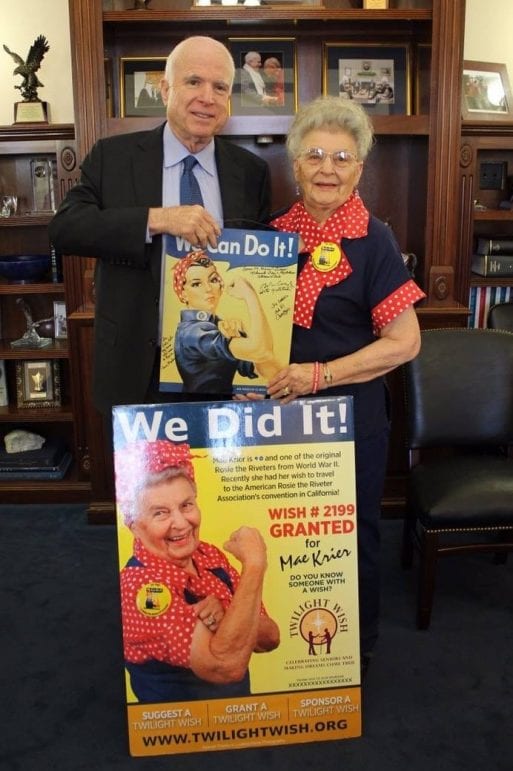
Mae Krier received a picture from former Senator John McCain after her visit, on which he had written: “To Mae Krier, with admiration and appreciation.”
Credit: Twilight Wish Foundation
Adult wish-granting organizations struggle to obtain enough funding. Relying on a combination of individual and corporate donors, community fundraisers and social media campaigns, they say no amount is too small. “Little efforts can really equate to a sizeable amount for us,” said Heyer, CEO of the Dream Foundation, which has received money from supporters’ garage sales, chili cook-offs and beer-brewing competitions. Others, such as the volunteers at Ally’s Wish, which is entirely volunteer-run, or Forkin at the Twilight Wish Foundation, find themselves investing a great deal of their personal time and financial resources to supplement donations. Still, they say it’s worth it. “I got blessed,” Forkin said. “It’s not like [my money] was in the stock market and I lost it in the stock market. I put it into something that made this country better, which is what I feel I’m here to do.”
For many at adult wish-granting organizations, the work they do brings the important aspects of life back into focus. Family time, human connection, inner healing, honoring our elders, appreciating nature, and helping each other have all taken on a heightened meaning and significance. “What I do really transforms lives,” said Bess, founder of the James Bess Foundation. She encouraged those with an illness to get over any hurdles telling them they’re not worthy or deserving enough to participate. “You’re encouraged to apply and go for it. Because honestly, there’s nothing to lose,” she said.
For Carroll, founder of the Fill Your Bucket List Foundation, the same applies to all of us. “How important and precious our time together is,” Carroll said. “We should all live our bucket lists all the time, and not wait. Let people know you love them, and make those dreams come true.”
An Important Note to Our Readers
SevenPonds is delighted to share these resources with our readers. But please be aware that we are not affiliated with any of the organizations mentioned in this article, nor can we make arrangements or inquiries on your behalf. If you would like help arranging to have a wish granted for a loved one, please contact the appropriate organization directly.
Thank you!

 Adult Make-A-Wish Style Programs Bring Joy and Connection
Adult Make-A-Wish Style Programs Bring Joy and Connection


 “Help Me, Helen”
“Help Me, Helen”

 “As Tears Go By” by Marianne Faithfull
“As Tears Go By” by Marianne Faithfull














